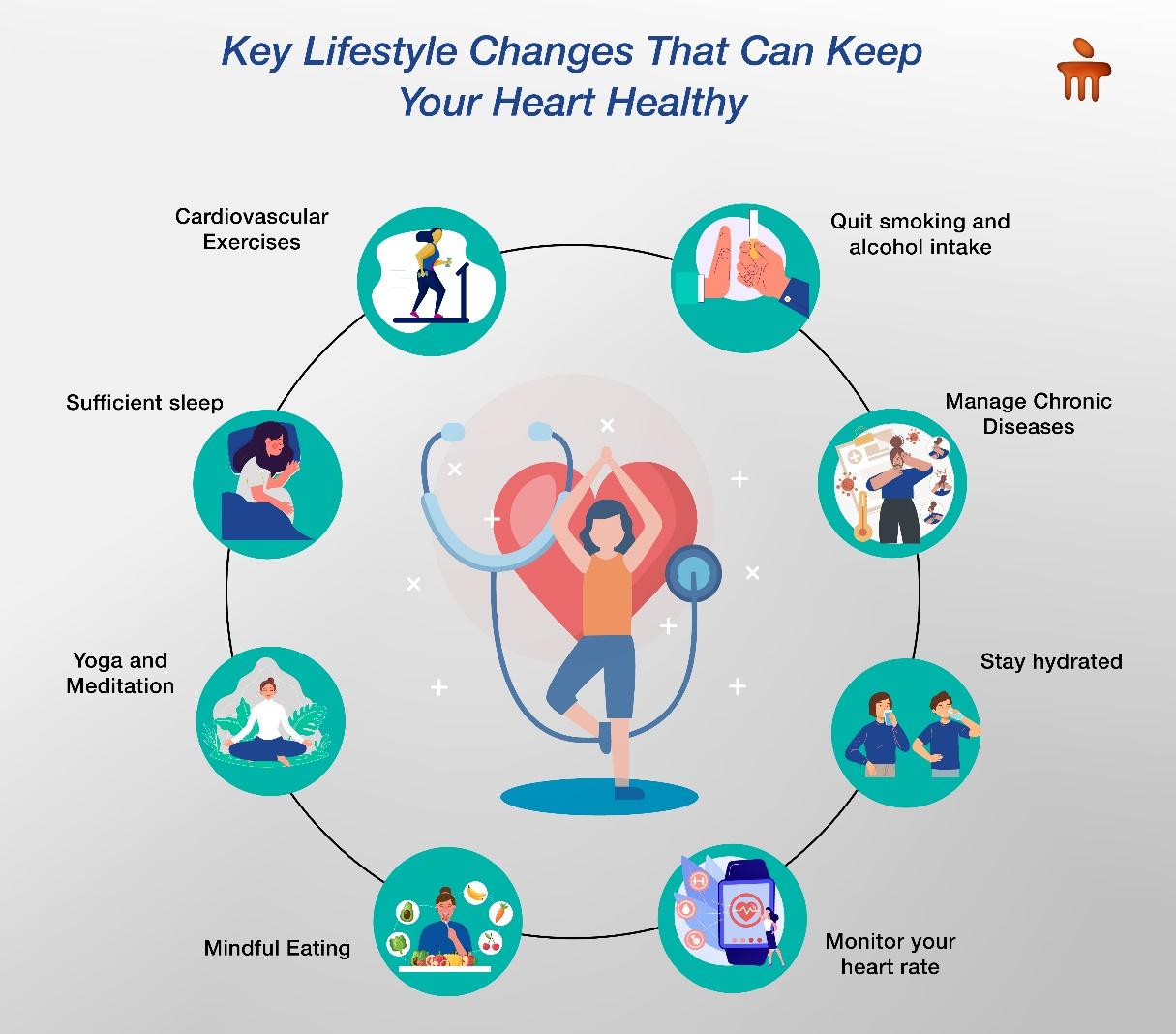
Maintaining a healthy and happy heart is paramount for a vibrant and fulfilling life. Just one change in your day-to-day activities can significantly change your life, and make sure to live a healthy and happy life. Making simple lifestyle changes and following simple heart-healthy practices can substantially reduce the risk of heart disease and improve cardiovascular health. Consult a heart hospital in Bangalore if you are already experiencing heart conditions and require treatment.
In this article, explore a variety of ways that can help your heart in optimal condition, allowing you to enjoy life ahead.

8 Best Suggested Practices To Keep Your Heart Healthy Are Listed Below
-
Cardiovascular Exercises
Cardiovascular exercise is one of the most effective ways to strengthen your heart. Practising any physical activity a day will keep all diseases away. Include physical activities in your day-to-day life. Indulge in any physical activity for about 150-170 minutes on a weekly basis. Include physical activities, including walking, swimming, and cycling, to strengthen your heart health.
-
Mindful Eating
Maintaining a heart-healthy diet goes hand in hand with engaging activities. Include a variety of nuts, seeds, fruits and vegetables rich in whole grains and proteins. Limit the intake of saturated fats, cholesterol, added sugars and sodium. Incorporate foods like berries, fatty fish, nuts and seeds in your diet since they benefit your heart’s health.
-
Yoga and Meditation
In the hustle and bustle of everyday life, stress can take a toll on your heart. Practising yoga and meditation provides a calming effect and reduces stress levels. Deep breathing exercises in yoga help lower blood pressure, while meditation techniques alleviate anxiety and improve well-being. By managing stress, you protect your heart from the negative impact of chronic stressors.
-
Quit Smoking and Alcohol Intake
Smoking is a big risk factor for heart disease. Smoking and intake of alcohol damage blood vessels, raise blood pressure and decreases oxygen levels. Quitting smoking and alcohol is one of the best things to do for heart health.
-
Sufficient Sleep
Adequate sleep is essential for maintaining a healthy heart. Take a quality sleep of 7-9 hours every night. Less sleep can increase the risk of heart disease, high blood pressure and obesity. Establish a regular sleep schedule, create a comfortable sleep environment, and practice relaxation techniques to ensure restful sleep.
-
Stay Hydrated
Proper hydration is crucial for a healthy heart. Drinking adequate water helps maintain optimal blood volume, allowing the heart to pump blood more effectively. Dehydration can strain the cardiovascular system and lead to complications. Drink at least 8 glasses of water daily, or more, if you engage in strenuous physical activities.
-
Monitor your Heart Rate
Consider using a fitness tracker to keep track of your heart rate. Maintaining an appropriate target heart rate helps you exercise at an intensity that promotes cardiovascular fitness without straining your heart. Consult a healthcare professional to determine your target heart rate range based on age, fitness level and health status.
-
Manage Chronic Diseases
Take a proactive step to managing chronic conditions affecting heart health, such as high cholesterol, blood pressure, and diabetes. Follow your healthcare provider’s recommendations, take prescribed medications regularly and make necessary lifestyle modifications to keep these conditions under control.
A healthy heart is a precious asset that requires care and attention. Incorporating these activities into your lifestyle can fortify your cardiovascular system and promote optimal health. From exercises to yoga, quitting smoking and consumption of alcohol, there are countless ways to keep your heart healthy. So, lace up your shoes, embrace a heart-healthy lifestyle, and embark on a journey towards thriving a healthier and happier life. Consult only the best cardiologist in Bangalore for treatment and care related to heart conditions.
FAQs
-
How often should I engage in cardiovascular exercises to maintain a healthy heart?
Aim for at least 150 minutes of moderate exercise or 75 minutes of vigorous exercise every week. You can divide this time into sessions of 30 minutes five days a week or change it based on your schedule and fitness level.
-
How does stress affect heart health, and how can I manage it?
Chronic stress can harm your heart health. High-stress levels can increase blood pressure and contribute to the development of heart diseases. To manage stress, consider practising relaxation exercises like yoga, meditation and deep breathing. Creating a balance between work, personal life, and self-care is crucial for stress management.
-
Are there any specific foods that are beneficial for the heart?
Yes, certain foods promote heart health. Include a variety of nuts, seeds, fruits and vegetables rich in whole grains and proteins. These foods provide essential nutrients, fibre and healthy fats that support cardiovascular health. Additionally, limit your intake of processed food, and sugary snacks as they increase the risk of heart disease.
-
How long does it take to see improvements in heart health through regular exercise?
The timeline for experiencing improvements in heart health can vary depending on individual factors such as baseline fitness, age and overall health conditions. However, you can start experiencing some benefits with consistent effort within a few weeks. Long-term commitment to healthy-heart activities is essential to maintain and further improve cardiovascular health.





















 5 Min Read
5 Min Read













